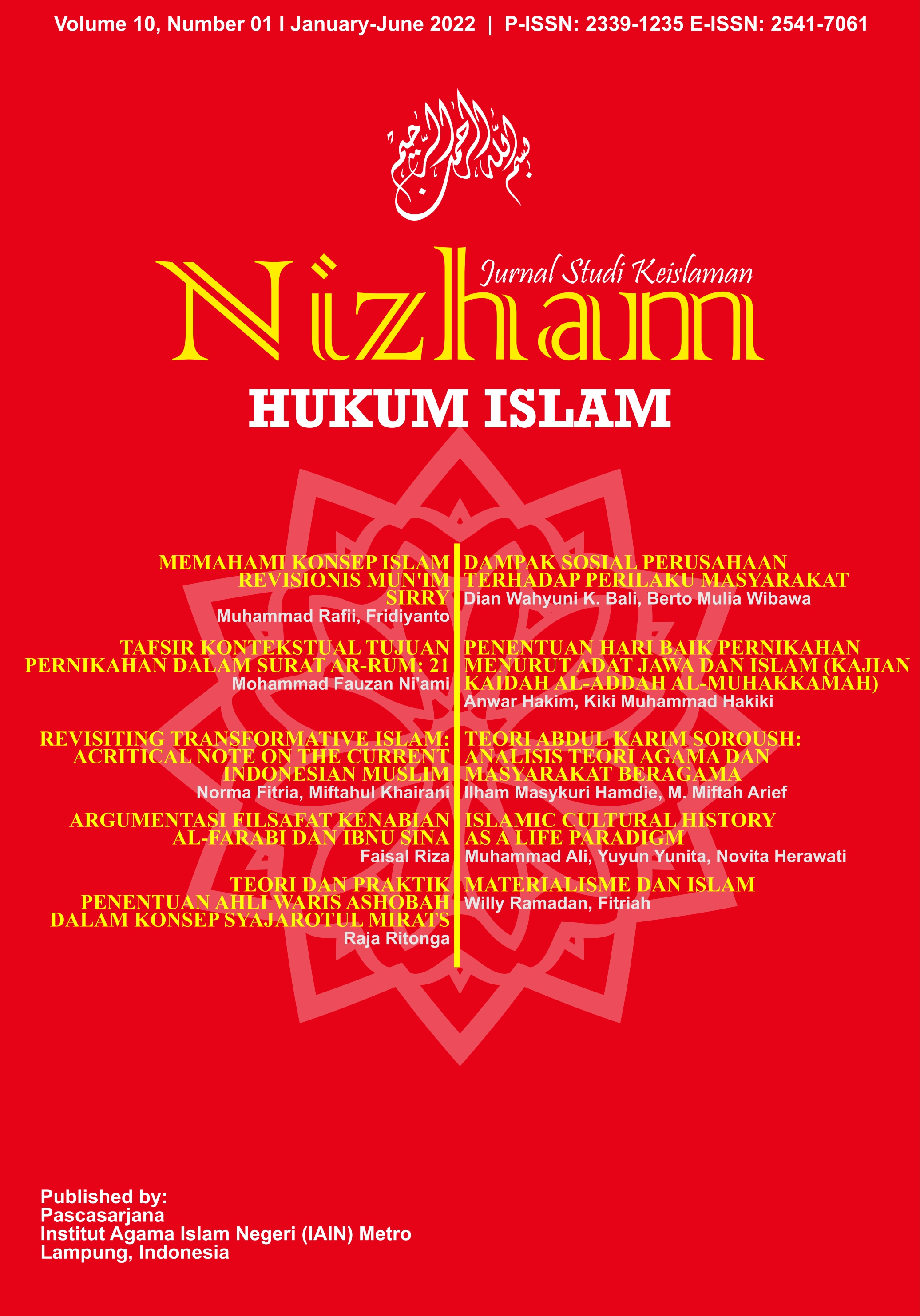TEORI DAN PRAKTIK PENENTUAN AHLI WARIS ASHOBAH DALAM KONSEP SYAJAROTUL MIRATS
DOI:
https://doi.org/10.32332/nizham.v10i1.6854Keywords:
Ashobah, Islamic inheritance, Syajarotul miratsAbstract
In Islamic heirs, the process of determining the heirs is carried out before the division of inheritance. Categories of heirs are grouped by their status and kinship with heirs. Ashobah is a group of heirs who are understood as the beneficiaries of the rest of the property. However, the heirs of the ashobah do not always receive the remaining property, but the ashobah group also cannot get the inherited property at all. This study aims to describe the theory and practice of determining the ashli of the heirs of ashobah based on the concept of shajarotul mirat. This research uses qualitative methods with the type of literature research. All collected data are analyzed descriptively. The results of the study explained that the heirs of the ashobah in obtaining the estate were among the three possibilities. First, ashobah gets all the inheritance. Secondly, the ashobah gets the rest of the inheritance after the ashabul furudh group. Third, ashobah does not inherit at all. Furthermore, there is only one heir who becomes an ashobah and there cannot be two ashobahs. In the concept of shajarotul mirat, all types of ashobah are judged based on jihhah, qorobah and quwwatul qorobah on the path of bunuwah, ubuwah, ukhuwah and 'umumah.
Downloads
References
Dwi Wulandari. “Bagian Waris Bagi Janda Dalam Hukum Kewarisan Islam Dan Kompilasi Hukum Islam.” Nizham 8, no. 01 (2020): 73–81.
Fitriyati, Yusida. “Kedudukan Ashabah Dalam Kasus ’Aul Menurut Ibnu Abbas.” NURANI 14, no. 2 (2014): 1–14.
Henni Wijayanti, Arofah Windiani, A. Azis Muhammad. “Metode Yadawi Dan Identifikasi Memudahkan Menghafal Ketentuan Waris Di Dalam Alqur’an.” WIDYA Yustisia 1, no. 1 (2013): 9–19.
Indonesia, Kementerian Agama Republik. Al- Qur’ân Al- Karîm Dan Terjemahannya. Surabaya: Halim, 2014.
Khalifah, Muhammad Taha Abu Al ’Ala. Ahkam Al Mawarits Dirasah Tathbiqiyah. Kairo: Dar Al Salam, 2005.
Ma’mun, Solihul Aminal. “MENTARJIH PENETAPAN NASAB ANAK ZINA KEPADA AYAH BIOLOGIS BERDASARKAN KONSEP ANAK & MAQṢ}AD HIFZ AL-NASL.” Al-Maslahah 16, no. 2 (2020): 198–215.
Qonun, Lajnah Qism Al Fiqh Fak. Syariah wal. Fiqh Al Mawarits. Kairo: Universitas Al Azhar, 2010.
Raja Ritonga, Akhyar, Jannus Tambunan, Andri Muda. “Konsep Syajarotul Mirats Dalam Praktek Kewarisan Islam.” Jurnal Samawa 2, no. 1 (2022): 99–113.
Raja Ritonga, Dedisyah Putra, Asrul Hamid. “Teori Dan Praktek Hijab-Mahjub Dalam Kewarisan Islam Menurut Konsep Syajarotul Mirats.” TAHKIM, Jurnal Peradaban Dan Hukum Islam 5, no. 1 (2022): 21–42.
Raja Ritonga, Martua Nasution. “Teori Penentuan Bagian Ahli Waris Ashabul Furudh.” Teraju: Jurnal Syariah Dan Hukum 4, no. 01 (2022): 15–25.
Ritonga, Raja. “Ta’yin; Penentuan Bagian Ahli Waris Sebelum Pembagian Warisan.” Al-Syakhshiyyah 3, no. 1 (2021): 29–47. https://doi.org/10.35673/as-hki.v3i1.1348.
Ritonga, Raja, and Amhar Maulana Harahap. “Dinamisasi Kewarisan Islam Pada Kasus Musytarikah Dalam Konsep Syajarotul Mirats.” Al-Ahwal Al-Syakhsiyyah: Jurnal Hukum Keluarga Dan Peradilan Islam 3, no. 1 (2022): 1–17. https://doi.org/10.15575/as.v3i1.17248.
Sakirman. “Konvergensi Pembagian Harta Waris Dalam Hukum Islam.” Al-’Adalah XIII, no. 2 (2016): 155–64.
Sari, Indah. “Pengaturan Pembagian Hak Kewarisan Islam Berdasarkan Kompilasi Hukum Islam (KHI).” Jurnal Ilmiah Hukum Dirgantara 7, no. 2 (2017): 86–109.
Shobuni, Syekh Muhammad Ali. Al Mawarits Fi Asy-Syari’ah Al- Islamiyah Fi Dhoui Al Kitab Wa As Sunnah. Kairo: Daar Ash Shobuni, 2002.
Sullivan, Johan. “Penyebab Mendapat Dan Tidak Mendapat Warisan Menurut Hukum Waris Islam.” Lex Privatum VII, no. 3 (2019): 87–94.
Wahyuni, Afidah. “Sistem Waris Dalam Perspektif Islam Dan Peraturan Perundang-Undangan Di Indonesia.” SALAM: Jurnal Sosial Dan Budaya Syar-I 5, no. 2 (2018): 147–60. https://doi.org/10.15408/sjsbs.v5i2.9412.
Washil, Naser Farid Muhammad. Fiqhu Al Mawarits Wa Al Wasiyah. Kairo: Dar Al Salam, 1995.











